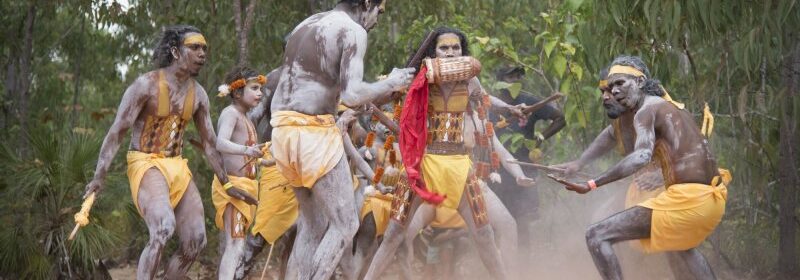Voice model deemed legally sound in Labor-dominated inquiry

Save articles for later
Add articles to your saved list and come back to them any time.
A Labor-dominated parliamentary committee has backed the government’s Voice to Parliament model, rejecting conservatives’ calls for changes to the constitutional amendment, in a move that clears a path for Prime Minister Anthony Albanese to put the proposal to the Australian people later this year.
But in a scathing dissenting report, the committee’s three Liberal members urged the parliament against adopting the current Voice proposal, concluding it posed an “unquantifiable” legal risk of tying up government action in litigation.
A ceremonial dance at the Garma Festival in northeast Arnhem Land last year, where Prime Minister Anthony Albanese first unveiled a draft amendment to enshrine the Voice in the Constitution.Credit: AAP
In findings handed down on Friday after a six-week inquiry into the referendum, the committee’s majority recommended the Voice be enshrined in the Constitution with the power to advise both parliament and executive government, citing the testimony of a group of eminent legal figures who endorsed the proposal as legally sound.
“Based on a careful examination of the evidence, the committee is of the view that the bill is constitutionally sound,” Labor committee chair Nita Green wrote in the majority report.
The report urged the parliament to pass the government’s constitutional alteration bill without change, concluding the provision giving the Voice the power to advise ministers and the public service was “appropriate, fit for purpose as per the wishes of First Nations peoples, and should not be amended”.
“The committee accepts the advice provided by legal experts and the solicitor-general that this would not unnecessarily slow down the operations of government, nor that it would give rise to a legal quagmire in which the courts would be overrun by cases,” the report said.
The findings will burnish the government’s resolve to press ahead without change and bring the bill on for debate in the lower house at the end of May, enabling a vote in the Senate before the July winter break.
Indigenous Australians Minister Linda Burney and Attorney-General Mark Dreyfus said the committee’s findings reflected the “overwhelming consensus of constitutional and legal experts”, while Voice architect Megan Davis said it was “now up to parliament to endorse the words as per the recommendation of the committee and give the Australian people the chance to vote”.
But the stark divide between the Labor and Liberal committee members reflects a broader debate over the second clause of the proposed amendment that gives the Voice the ability to “make representations” to the executive government. The inquiry heard evidence from constitutional conservatives, some of them Voice supporters, who raised concerns this scope could lead to a deluge of High Court litigation if the Voice believed it had not been properly consulted.
The Liberals’ dissenting report, led by deputy chair Keith Wolahan and signed by senators Andrew Bragg and Kerrynne Liddle, echoed these concerns and concluded: “The uncertainty and risk associated with the proposal as currently drafted are unquantifiable, and if adopted at a referendum would in effect be permanent.”
It found the proposal “should not be adopted in its current form” and canvassed several alternative options, including deleting the second clause, but said the Coalition would ultimately not stand in the way of Australians having their say at a referendum, clearing the path for the bill to pass the parliament in June.
This will enable the government to hold the referendum in its preferred month of October, in line with the constitutional requirement that the vote must be held between two and six months after the bill has passed the parliament.
The Liberals were also highly critical of the lack of formal public consultation on the drafting of the amendment, which was limited to the inquiry, and the short time frame for testing the legal effect of the constitutional change.
“The parliament should never again be asked to consider a constitutional change that is put forward without detail, without process, and without a proper understanding of the risks. More importantly, the Australian people should not be asked to vote on a serious constitutional change in those circumstances,” the Liberals said in their report.
Bragg, a long-time supporter of the concept of a Voice to parliament, submitted seven pages of additional comments to the committee that included a proposal for clause two to be further refined through additional words to address concerns about the risk of litigation. He said the chances of a successful referendum would be improved if the legal risks were minimised.
“The wording in the bill is just one of the dozens of iterations of the Voice drafting seen in recent years. The proposition that it cannot be further refined to eliminate risk is dishonest,” Bragg said.
The two anti-Voice groups – Warren Mundine’s Recognise a Better Way and the Fair Australia group, backed by CLP senator Jacinta Nampijinpa Price – merged their campaigns this week, pooling resources and consolidating their message under a new “Australians for Unity” banner.
Mundine, who gave evidence at the inquiry, said the committee’s recommendation the Voice bill proceed unamended was “not a surprise” given Labor’s majority.
“Anyone who says that the committee was going to change its mind was not serious. We all knew it was a stitch-up. But the important thing is we had the opportunity to air our views publicly,” Mundine said.
The committee comprised seven Labor members, three Liberals, one National, one Greens and one independent.
Cut through the noise of federal politics with news, views and expert analysis from Jacqueline Maley. Subscribers can sign up to our weekly Inside Politics newsletter here.
Most Viewed in Politics
From our partners
Source: Read Full Article
